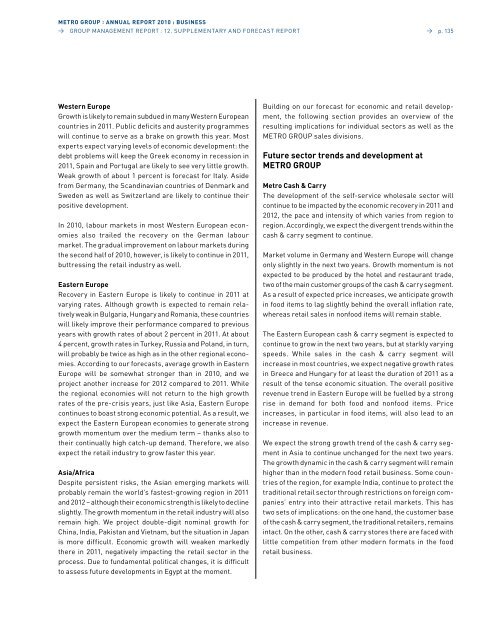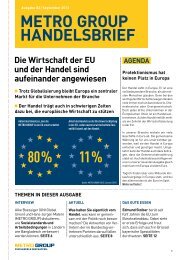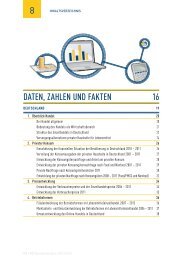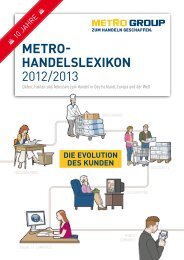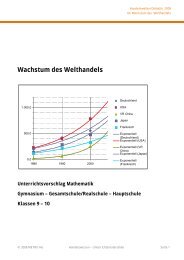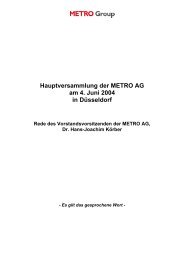pdf (2.5 MB) - METRO Group
pdf (2.5 MB) - METRO Group
pdf (2.5 MB) - METRO Group
Create successful ePaper yourself
Turn your PDF publications into a flip-book with our unique Google optimized e-Paper software.
<strong>METRO</strong> GROUP : ANNUAL REPORT 2010 : BUSINESS<br />
→ GROUP MANAGEMENT REPORT : 12. SUPPLEMENTARy ANd FORECAST REPORT<br />
Western Europe<br />
Growth is likely to remain subdued in many western European<br />
countries in 2011. Public deficits and austerity programmes<br />
will continue to serve as a brake on growth this year. Most<br />
experts expect varying levels of economic development: the<br />
debt problems will keep the Greek economy in recession in<br />
2011, Spain and Portugal are likely to see very little growth.<br />
weak growth of about 1 percent is forecast for Italy. Aside<br />
from Germany, the Scandinavian countries of denmark and<br />
Sweden as well as Switzerland are likely to continue their<br />
positive development.<br />
In 2010, labour markets in most western European economies<br />
also trailed the recovery on the German labour<br />
market. The gradual improvement on labour markets during<br />
the second half of 2010, however, is likely to continue in 2011,<br />
buttressing the retail industry as well.<br />
Eastern Europe<br />
Recovery in Eastern Europe is likely to continue in 2011 at<br />
varying rates. Although growth is expected to remain relatively<br />
weak in Bulgaria, hungary and Romania, these countries<br />
will likely improve their performance compared to previous<br />
years with growth rates of about 2 percent in 2011. At about<br />
4 percent, growth rates in Turkey, Russia and Poland, in turn,<br />
will probably be twice as high as in the other regional economies.<br />
According to our forecasts, average growth in Eastern<br />
Europe will be somewhat stronger than in 2010, and we<br />
project another increase for 2012 compared to 2011. while<br />
the regional economies will not return to the high growth<br />
rates of the pre-crisis years, just like Asia, Eastern Europe<br />
continues to boast strong economic potential. As a result, we<br />
expect the Eastern European economies to generate strong<br />
growth momentum over the medium term – thanks also to<br />
their continually high catch-up demand. Therefore, we also<br />
expect the retail industry to grow faster this year.<br />
Asia/Africa<br />
despite persistent risks, the Asian emerging markets will<br />
probably remain the world’s fastest-growing region in 2011<br />
and 2012 – although their economic strength is likely to decline<br />
slightly. The growth momentum in the retail industry will also<br />
remain high. we project double-digit nominal growth for<br />
China, India, Pakistan and vietnam, but the situation in Japan<br />
is more difficult. Economic growth will weaken markedly<br />
there in 2011, negatively impacting the retail sector in the<br />
process. due to fundamental political changes, it is difficult<br />
to assess future developments in Egypt at the moment.<br />
→ p. 135<br />
Building on our forecast for economic and retail development,<br />
the following section provides an overview of the<br />
resulting implications for individual sectors as well as the<br />
<strong>METRO</strong> GROUP sales divisions.<br />
Future sector trends and development at<br />
<strong>METRO</strong> GROUP<br />
Metro Cash & Carry<br />
The development of the self-service wholesale sector will<br />
continue to be impacted by the economic recovery in 2011 and<br />
2012, the pace and intensity of which varies from region to<br />
region. Accordingly, we expect the divergent trends within the<br />
cash & carry segment to continue.<br />
Market volume in Germany and western Europe will change<br />
only slightly in the next two years. Growth momentum is not<br />
expected to be produced by the hotel and restaurant trade,<br />
two of the main customer groups of the cash & carry segment.<br />
As a result of expected price increases, we anticipate growth<br />
in food items to lag slightly behind the overall inflation rate,<br />
whereas retail sales in nonfood items will remain stable.<br />
The Eastern European cash & carry segment is expected to<br />
continue to grow in the next two years, but at starkly varying<br />
speeds. while sales in the cash & carry segment will<br />
increase in most countries, we expect negative growth rates<br />
in Greece and hungary for at least the duration of 2011 as a<br />
result of the tense economic situation. The overall positive<br />
revenue trend in Eastern Europe will be fuelled by a strong<br />
rise in demand for both food and nonfood items. Price<br />
increases, in particular in food items, will also lead to an<br />
increase in revenue.<br />
we expect the strong growth trend of the cash & carry segment<br />
in Asia to continue unchanged for the next two years.<br />
The growth dynamic in the cash & carry segment will remain<br />
higher than in the modern food retail business. Some countries<br />
of the region, for example India, continue to protect the<br />
traditional retail sector through restrictions on foreign companies’<br />
entry into their attractive retail markets. This has<br />
two sets of implications: on the one hand, the customer base<br />
of the cash & carry segment, the traditional retailers, remains<br />
intact. On the other, cash & carry stores there are faced with<br />
little competition from other modern formats in the food<br />
retail business.


